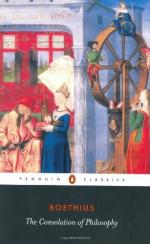|
This section contains 8,145 words (approx. 28 pages at 300 words per page) |

|
SOURCE: "Boethian Silence," in Medievalia et Human-istica, No. 12, 1984, pp. 97-125.
In the following essay, Lerer explores Boethius's notions of communication, dialogue, and rhetoric in the theological tractates and the Consolation of Philosophy.
Twenty years ago, in a landmark article, Joseph Mazzeo [in Journal of the History of Ideas 23 (1962)] identified St. Augustine's "rhetoric of silence" as the notable characteristic of his broader "attempt to assimilate classical rhetoric to Christian needs." Readers of Augustine long before Mazzeo recognized the Saint's attempted synthesis of Ciceronian rhetoric and Biblical narrative, and his contrast, expressed in De Doctrina Christiana, between the eloquence of words and the eloquence of things. But Mazzeo showed how the ideal of silence became for Augustine a method of communication between the spirit and Christ. "For Augustine all dialectic, true rhetoric, and thought itself were but attempts to reascend to that silence from which the world fell into the...
|
This section contains 8,145 words (approx. 28 pages at 300 words per page) |

|


